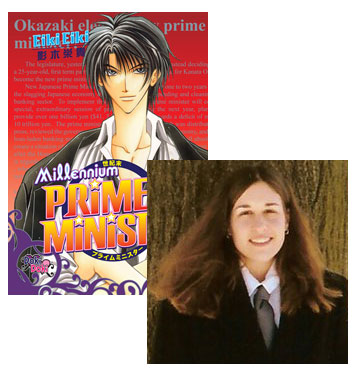Danica Davidson on Adapting Manga for English Readers

One of the advantages of participating in social networks like Twitter and Facebook is that it puts me in touch with Beatrice readers from lots of different backgrounds, at various stages in their writing careers. I “met” Danica Davidson through Facebook a while back, and when she told me about a recent essay she’d written for another website, which I ended up linking to on the Beatrice Facebook page, we got to talking about something she could do here—I’d known for a while that she had worked in manga, and I’d always been interested in hearing about what it’s like to work on those books, so here we are! (And, by the way, happy birthday to the author!)
Writing is just part of what I do. My main goal is to be a professional novelist (I’ve been interviewed by the Los Angeles Times and featured on the Guide to Literary Agents website about this) and I’ve completed more than one novel. While I work toward this goal, I pay the bills and build my readership as a freelance writer. I’ve written a few hundred articles for more than thirty magazines, newspapers and websites, but the freelance gig that tends to interest people the most would have to be my involvement in the manga translation process.
Manga are Japanese graphic novels and they’ve given me quite a bit of freelance work, as I’ve written about them for such places as Booklist, Comic Book Resources, Graphic Novel Reporter and Publishers Weekly, to name a few. But I’ve also been part of the behind-the-scenes work in the manga world: I’ve written the English adaptation.
It occurred to me that it would be a fun and significant job I could do, so I wrote to manga publishing companies, inquiring. I already knew people from most the companies and they were familiar with my reviews. Digital Manga Publishing, one of the main manga companies in America, gave me a “test,” having me work on some sample pages. I passed and was hired as a freelance adaptor.
When I tell people about my work adapting manga, they usually assume I’m a translator and want to know how I learned Japanese. (“Isn’t that a hard language?” they ask.) Here’s the confession: I don’t know Japanese other than a few words and phrases. With the books I worked on, someone else did the translation. Sometimes the translators also do the rewrite, but sometimes the task is split up if the translator’s skills are solely in language and not in writing. That’s how I came in. I was given the Japanese book (so I could see what was going on) and the literal translation as a Word document. In the Word document, everything was mapped out with numbers and names. Pages were numbered, boxes were numbered, and characters’ names were given in the order they talked. Next to the characters’ names were the translations of what they said.
The literal translation was… well… not very readable. By that, I mean that it sounded stiff and absurd, not to mention some parts were translated so literally that they made no sense at all. My task was rewriting the literal translation so it sounded like vernacular English. The original mood of the story also had to be there. For instance, the first book I worked on, Millennium Prime Minister, could easily be called a nonsense comedy. I had to make sure the comedy still came through in the English words.
There was more than one occasion where the literal translation was so out there that I needed to contact someone at the company for help. I never once spoke to the translator, but the company would get in contact with him or her for extra insight on a passage.
I worked on books that referred to Japanese politics and history. Several times I had to look up what the book was talking about and leave a notice to the editor to footnote something so our readers would understand. Likewise, it was my job to point out when the print got bigger or smaller so the person taking care of the lettering would be able to match it.
The first book I worked on took a couple of weeks because I was still getting the feel of it. (And that was about how long I had, because deadlines here are fast and furious.) After that, I could get the job finished in a matter of days. Once all was said and done, I turned in what I’d written and the book was published less than a year later. Yes, the turn around time was quite quick, and now I regularly see Millennium Prime Minister in bookstores, sporting my name on the copyright page under the title of “Editor.” This has been a very unique form of working in the book publishing world, and one that has both been interesting to me and taught me new writing skills.
29 January 2011 | in translation |

 Our Endless and Proper Work is my new book with Belt Publishing about starting (and sticking to) a productive writing practice.
Our Endless and Proper Work is my new book with Belt Publishing about starting (and sticking to) a productive writing practice. 
